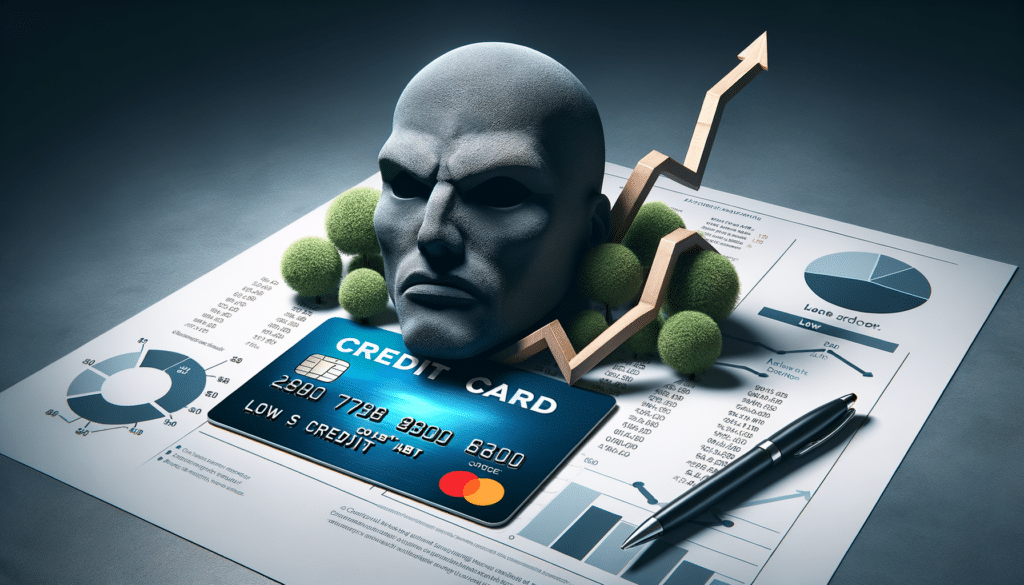Understanding Low Credit Scores and Their Impact
Credit scores are a crucial part of financial health, impacting everything from loan approvals to interest rates. A low credit score often signifies past financial challenges, such as missed payments or high credit utilization. For many, this can make accessing credit cards difficult, yet it’s important to understand that not all hope is lost. Credit cards designed for low credit scores can be a valuable tool in rebuilding credit.
Low credit scores typically fall below 580 on the FICO scale. This can result from various factors, including late payments, defaults, or even a lack of credit history. The impact of a low credit score can be significant, often leading to higher interest rates and less favorable terms on loans and credit cards. However, some credit cards cater specifically to individuals with low credit scores, offering a pathway to improve financial standing.
These credit cards often come with higher interest rates and fees, but they provide an opportunity to demonstrate responsible credit behavior. By making timely payments and keeping balances low, individuals can gradually improve their credit scores. This can open doors to better financial products in the future, making it essential to understand the options available and how they can be used effectively.
Types of Credit Cards Available for Low Credit Scores
For those with low credit scores, selecting the right type of credit card is crucial. There are several options available, each with its own set of features and benefits. Understanding these can help individuals make informed decisions about which card best suits their needs.
Secured credit cards are one of the most common options for those with low credit scores. These cards require a security deposit, which acts as collateral and determines the credit limit. While it might seem like a drawback, secured cards can be a stepping stone to rebuilding credit, as they report to major credit bureaus.
Another option is unsecured credit cards designed for low credit scores. These cards do not require a deposit but often come with higher interest rates and fees. They can still be beneficial if managed responsibly, as they also report to credit bureaus, aiding in credit score improvement.
Lastly, retail store credit cards can be an option. These cards are generally easier to obtain and can help build credit if used wisely. However, they often come with high-interest rates and are limited to specific stores.
- Secured credit cards require a deposit but offer a path to credit improvement.
- Unsecured cards for low credit scores may have higher fees but no deposit requirement.
- Retail store cards are easier to obtain but have higher interest rates.
How to Choose the Right Credit Card for Your Needs
Choosing the right credit card when you have a low credit score involves careful consideration of several factors. It’s important to assess your financial situation and determine which card features align with your goals. Here are some key considerations:
First, consider the fees associated with the card. Many credit cards for low credit scores come with annual fees, higher interest rates, and other charges. It’s crucial to understand these costs and ensure they fit within your budget. Additionally, look for cards that offer benefits like cash back or rewards, which can provide added value.
Next, evaluate the card’s reporting practices. A card that reports to all three major credit bureaus is essential for building credit. This ensures that your responsible credit behavior is reflected in your credit score over time.
Finally, consider the customer service and support offered by the card issuer. Good customer service can be invaluable, especially if you encounter issues or have questions about your account. Reading reviews and researching the issuer’s reputation can provide insights into their service quality.
- Assess fees and interest rates to ensure affordability.
- Look for cards that report to all major credit bureaus.
- Consider customer service quality and issuer reputation.
Strategies for Using Credit Cards to Improve Credit Scores
Once you’ve selected a credit card, using it wisely is key to improving your credit score. Here are some strategies to help you make the most of your credit card:
One of the most effective ways to boost your credit score is by making timely payments. Late payments can significantly harm your credit score, so setting up automatic payments or reminders can help ensure you never miss a due date.
Another strategy is to keep your credit utilization low. This means using only a small portion of your available credit. Aim to keep your credit utilization below 30% to positively impact your credit score.
Additionally, consider using your credit card for small, regular purchases that you can pay off each month. This demonstrates consistent, responsible credit use and can gradually improve your score.
- Set up automatic payments to avoid late fees.
- Maintain a credit utilization rate below 30%.
- Use the card for manageable, regular purchases.
Conclusion: Building a Strong Financial Future
Credit cards for low credit scores offer a valuable opportunity to rebuild financial health. By understanding the options available and using credit responsibly, individuals can improve their credit scores and access better financial products in the future. It requires patience and discipline, but the rewards of a strong credit profile are well worth the effort.
Remember, the journey to better credit starts with informed choices and responsible financial behavior. With the right approach, credit cards can be a powerful tool in achieving financial stability and opening doors to a brighter financial future.





